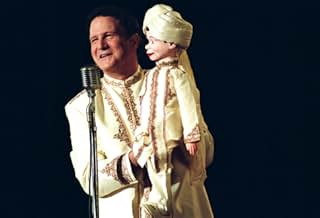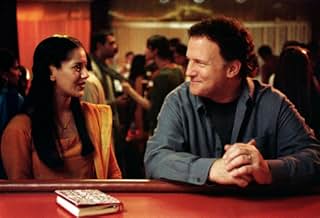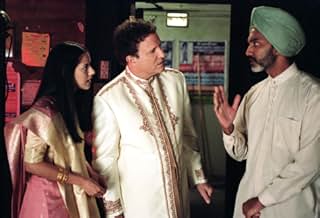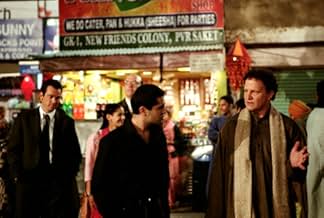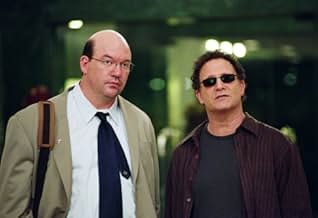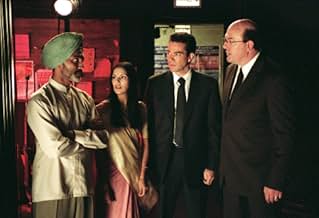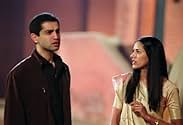IMDb RATING
5.5/10
3.5K
YOUR RATING
To improve its relations with Muslim countries, the United States government sends comedian Albert Brooks to south Asia to write a report on what makes followers of Islam laugh.To improve its relations with Muslim countries, the United States government sends comedian Albert Brooks to south Asia to write a report on what makes followers of Islam laugh.To improve its relations with Muslim countries, the United States government sends comedian Albert Brooks to south Asia to write a report on what makes followers of Islam laugh.
Paul Jerome
- Studio Executive
- (as Paul Eric Jerome)
Fred Thompson
- Fred Dalton Thompson
- (as Fred Dalton Thompson)
Nayan Raina
- Job Applicant
- (as Sunny Raina)
- Director
- Writer
- All cast & crew
- Production, box office & more at IMDbPro
Featured reviews
Albert Brooks' films are an acquired taste. That said, his new film, "Looking for Comedy in the Muslim World", offers an unforgettable trip to some exotic locations in search of laughter, which is something Mr. Brooks does best. The point of his film seems to be that by laughing during difficult situations will unite people instead of separating them.
This is a film that has a lot of laughs in the way Albert Brooks throws his one liners and makes a satire of the idiocy of the assignment he has been given by those innovative guys in our government. Along the way, Mr. Brooks points out at how other cultures, India, in this case, has managed to become an integral part of ours in the way most American companies have outsourced jobs to that country. That becomes evident when we get to listen what is being said by the telephone people that work in the same building where they have found an office for the comedian. Even the White House phones seem to be answered by Indian operators!
This film is obviously not for everyone. Mr. Brooks' fans will have a field day watching this unassuming comic genius going through India and Pakistan in search of fun, but alas, what's funny for us it's not for other people. One of the funniest moments shows how a worried Brooks misses the magnificent Taj Mahal because he is too preoccupied with the job he has been given.
Of course, Albert Brooks is the best interpreter of himself. He has a style that is not obnoxious, or in your face. His presence in the film playing himself strikes the right note. Sheetal Sheth is a revelation as Maya, the eager Indian assistance who can't get Mr. Brooks' jokes however hard she tries. John Carroll Lynch and Jon Tunney are seen as Stewart and Mark, two men appointed to help Brooks perform his assignment. Penny Marshall appears at the beginning of the film as herself.
The film will reward the viewer going with an open mind to see the film because Albert Brooks is a funny man with the heart in the right place.
This is a film that has a lot of laughs in the way Albert Brooks throws his one liners and makes a satire of the idiocy of the assignment he has been given by those innovative guys in our government. Along the way, Mr. Brooks points out at how other cultures, India, in this case, has managed to become an integral part of ours in the way most American companies have outsourced jobs to that country. That becomes evident when we get to listen what is being said by the telephone people that work in the same building where they have found an office for the comedian. Even the White House phones seem to be answered by Indian operators!
This film is obviously not for everyone. Mr. Brooks' fans will have a field day watching this unassuming comic genius going through India and Pakistan in search of fun, but alas, what's funny for us it's not for other people. One of the funniest moments shows how a worried Brooks misses the magnificent Taj Mahal because he is too preoccupied with the job he has been given.
Of course, Albert Brooks is the best interpreter of himself. He has a style that is not obnoxious, or in your face. His presence in the film playing himself strikes the right note. Sheetal Sheth is a revelation as Maya, the eager Indian assistance who can't get Mr. Brooks' jokes however hard she tries. John Carroll Lynch and Jon Tunney are seen as Stewart and Mark, two men appointed to help Brooks perform his assignment. Penny Marshall appears at the beginning of the film as herself.
The film will reward the viewer going with an open mind to see the film because Albert Brooks is a funny man with the heart in the right place.
Albert Brooks should look elsewhere to fulfill his quest of learning what makes Muslims laugh. The approach of this film and its execution are so heavily drenched in Western stereotypes about the people they want to study, it's a surprise the title doesn't use the word 'Moslem' instead of 'Muslim'.
Made in a sort of 'wink, wink, nudge, nudge' manner, it has Brooks playing himself at a point in time when his career prospects are slim and decent roles are hard to come by. Luckily for him the white house and state department come knocking and Brooks is sent off to the subcontinent to write a report on what makes Muslims laugh. Forget that India is officially a secular nation (the movie reasons there are about 150 Muslims there) or that Al spends in all about 15 minutes in neighboring Pakistan (an Islamic country), the fact remains that nothing about this film, except a scant few one liners, is funny or amusing. The list of crimes it commits with regard to typecasting is enormous and unforgivable an office in the tech capital of the world has no computer, trendy young English speaking Indian women only wear sari's and the Pakistani's that meet Brooks look like bearded fundamentalists who smoke hashish- all of which shows great naiveté on the part of everyone involved with this misguided attempt, even if the irresponsible intent was to be tongue in cheek.
The method used by Albert Brooks to understand what is considered funny to these people is putting on a standup comedy show in both India and Pakistan, but this doesn't work too well. Was it ever considered by him that perhaps it isn't the understanding of the English language that prevents the Indian audience from finding him funny, but that all the gags are soaked in cultural references completely alien to them (Halloween, 'The Exorcist' etc.)? Or that the people being targeted aren't really aware of just what standup comedians really do. It becomes pretty clear that the movie is played for obvious lowbrow humor by displaying ignorance about its purpose that borders on being a sham and the real point is to milk the present hysteria about the people of the Muslim community and make some quick bucks in process via the mild publicity it has already received for its attention grabbing title. Give this one a pass.
Made in a sort of 'wink, wink, nudge, nudge' manner, it has Brooks playing himself at a point in time when his career prospects are slim and decent roles are hard to come by. Luckily for him the white house and state department come knocking and Brooks is sent off to the subcontinent to write a report on what makes Muslims laugh. Forget that India is officially a secular nation (the movie reasons there are about 150 Muslims there) or that Al spends in all about 15 minutes in neighboring Pakistan (an Islamic country), the fact remains that nothing about this film, except a scant few one liners, is funny or amusing. The list of crimes it commits with regard to typecasting is enormous and unforgivable an office in the tech capital of the world has no computer, trendy young English speaking Indian women only wear sari's and the Pakistani's that meet Brooks look like bearded fundamentalists who smoke hashish- all of which shows great naiveté on the part of everyone involved with this misguided attempt, even if the irresponsible intent was to be tongue in cheek.
The method used by Albert Brooks to understand what is considered funny to these people is putting on a standup comedy show in both India and Pakistan, but this doesn't work too well. Was it ever considered by him that perhaps it isn't the understanding of the English language that prevents the Indian audience from finding him funny, but that all the gags are soaked in cultural references completely alien to them (Halloween, 'The Exorcist' etc.)? Or that the people being targeted aren't really aware of just what standup comedians really do. It becomes pretty clear that the movie is played for obvious lowbrow humor by displaying ignorance about its purpose that borders on being a sham and the real point is to milk the present hysteria about the people of the Muslim community and make some quick bucks in process via the mild publicity it has already received for its attention grabbing title. Give this one a pass.
In an inspired cinematic premise, especially in these times, Albert Brooks plays himself as a comedian asked to find out what makes a large portion of the world laugh.
Of course, execution of this concept leaves a bit to be desired, but it does have its fairly funny moments, especially in the opening moments, when Brooks aspires to be the lead in a remake of "Harvey." He fails to impress the director (Penny Marshall) with his desire to be "the new Jimmy Stewart," and Marshall's phony, "I liked your work in 'The In-Laws'" doesn't help his ego, either.
At home, he receives a letter from the State Department asking for him to be part of a special commission deigned to found out what Muslims construe as comedy. He goes to Washington DC, meets former Tennessee senator Fred Dalton Thompson (TV's "Law & Order"), and agrees to travel to India and Pakistan to see what makes the population laugh (despite his assignment to write a 500-page report on the topic).
He leaves his lovely wife, Amy Ryan ("Capote," 'War of the Worlds") and cute-as-a-button daughter, Laura (Emma Lockhart, "Batman Begins") for a month's adventure - not for money, but for the opportunity to be awarded the Medal of Freedom ("the nice one - with the colored ribbon").
Brooks makes the point some might bring up that India is basically a Hindi country, although over 100 million Muslims reside there (also, it's doubtful Brooks, as a Jew, would have been welcome in some of the more militant Middle Eastern countries).
Anyway, Brooks soon begins his patented celebrity whining on the flight to New Dehli, as he and his two State Department escorts, Stuart (John Carroll Lynch, "Gothika") and Mark (Jon Tenney, TV's "The Closer") are forced to fly economy class, and are then stuck in a rundown office. During these interior office scenes, Brooks keeps passing a roomful of phone operators ("There are two spin cycles on that machine," "Welcome to the William Morris Agency," "This is the White House, how may I direct your call") in another funny bit.
After hiring a lovely Indian woman, Maya (Sheetal Sheth), Brooks begins asking people on the street what makes them laugh. He is given answers from "I don't know," to "I don't speak English and please don't touch me," to a long and involved joke about being happy and laughing. Not garnering anything from this effort, Brooks decides to put on a comedy concert for about 300 Indians. This segment is pretty funny, as well, as few in the audience understand the comedian's humor (he tells a lame Halloween "Gandhi" joke, does a really bad ventriloquist act and the old "changing the improve" bit) and have little or no reaction to it.
Later, he sneaks into Pakistan and does the same routine for a group of stoned "budding comedians" who do not speak English (it's a huge success), accidentally starts an armed conflict between the two countries and is offered a part as a Hebrew man who moves into a mostly Muslim apartment complex in the inaugural situation comedy from al-Jazeera, "That Darn Jew."
The bottom line of this movie is that Muslims really don't laugh a whole lot, especially if the jokes are not funny (I guess that could be said of most anyone)and they do not get the subject. It could have been even more biting and daring, but I suppose Brooks (who wrote and directed, as well) didn't want to rock the boat too much.
I've liked most of Brooks' work (he was great in "Broadcast News" and deserved the Oscar; and "Defending Your Life," "Lost In America" and "Real Life" were terrific films), and while some jokes fall pretty flat here (as does the weak subplot of Maya and her Iranian boyfriend), this is still pretty decent work.
Yeah, I would have liked to have seen him do his stand-up in Iran, Jordan, Kuwait, Egypt or even Saudi Arabia, but I understand his reasoning (sort of). Plus, I laughed more often than not, so, as a comedy, it did its job, at least in my opinion.
Of course, execution of this concept leaves a bit to be desired, but it does have its fairly funny moments, especially in the opening moments, when Brooks aspires to be the lead in a remake of "Harvey." He fails to impress the director (Penny Marshall) with his desire to be "the new Jimmy Stewart," and Marshall's phony, "I liked your work in 'The In-Laws'" doesn't help his ego, either.
At home, he receives a letter from the State Department asking for him to be part of a special commission deigned to found out what Muslims construe as comedy. He goes to Washington DC, meets former Tennessee senator Fred Dalton Thompson (TV's "Law & Order"), and agrees to travel to India and Pakistan to see what makes the population laugh (despite his assignment to write a 500-page report on the topic).
He leaves his lovely wife, Amy Ryan ("Capote," 'War of the Worlds") and cute-as-a-button daughter, Laura (Emma Lockhart, "Batman Begins") for a month's adventure - not for money, but for the opportunity to be awarded the Medal of Freedom ("the nice one - with the colored ribbon").
Brooks makes the point some might bring up that India is basically a Hindi country, although over 100 million Muslims reside there (also, it's doubtful Brooks, as a Jew, would have been welcome in some of the more militant Middle Eastern countries).
Anyway, Brooks soon begins his patented celebrity whining on the flight to New Dehli, as he and his two State Department escorts, Stuart (John Carroll Lynch, "Gothika") and Mark (Jon Tenney, TV's "The Closer") are forced to fly economy class, and are then stuck in a rundown office. During these interior office scenes, Brooks keeps passing a roomful of phone operators ("There are two spin cycles on that machine," "Welcome to the William Morris Agency," "This is the White House, how may I direct your call") in another funny bit.
After hiring a lovely Indian woman, Maya (Sheetal Sheth), Brooks begins asking people on the street what makes them laugh. He is given answers from "I don't know," to "I don't speak English and please don't touch me," to a long and involved joke about being happy and laughing. Not garnering anything from this effort, Brooks decides to put on a comedy concert for about 300 Indians. This segment is pretty funny, as well, as few in the audience understand the comedian's humor (he tells a lame Halloween "Gandhi" joke, does a really bad ventriloquist act and the old "changing the improve" bit) and have little or no reaction to it.
Later, he sneaks into Pakistan and does the same routine for a group of stoned "budding comedians" who do not speak English (it's a huge success), accidentally starts an armed conflict between the two countries and is offered a part as a Hebrew man who moves into a mostly Muslim apartment complex in the inaugural situation comedy from al-Jazeera, "That Darn Jew."
The bottom line of this movie is that Muslims really don't laugh a whole lot, especially if the jokes are not funny (I guess that could be said of most anyone)and they do not get the subject. It could have been even more biting and daring, but I suppose Brooks (who wrote and directed, as well) didn't want to rock the boat too much.
I've liked most of Brooks' work (he was great in "Broadcast News" and deserved the Oscar; and "Defending Your Life," "Lost In America" and "Real Life" were terrific films), and while some jokes fall pretty flat here (as does the weak subplot of Maya and her Iranian boyfriend), this is still pretty decent work.
Yeah, I would have liked to have seen him do his stand-up in Iran, Jordan, Kuwait, Egypt or even Saudi Arabia, but I understand his reasoning (sort of). Plus, I laughed more often than not, so, as a comedy, it did its job, at least in my opinion.
If you have ever been to India or intimately know peoples of the Indian subcontinent you should enjoy this movie. Mr Brooks has an interesting idea in this film which is not quite as developed as it could be. However, recently having visited Delhi and Agra and flying to Delhi on a plane that was like "a Greyhound bus to India". I and an Indian friend throughly enjoyed this film. There are great scenes of Delhi...street scenes showing the chaos and confusion,like vehicles on the roads, including that green and yellow 3 wheeled motorized rickshaw which we ventured on, cows and an occasional elephant in the street...and various historic Muslim and Hindu monuments. We laughed and laughed. It was silly, fun and nostalgic for us and great entertainment for a rainy Saturday evening.
I liked the movie quite a lot. Being from India, and living in a US for a little while, I deal with cultural differences very often in my own life. While differences in food, garments, language and architecture are easy to feel, they are the tip of a cultural iceberg. And that is what this movie conveys very well. We cannot hope to understand other cultures unless we recognize their deeper aspects and humour is one such. In the movie, Brooks steals into Pakistan to meet the aspiring comedians. But the funny question is, did they laugh with him, or his Pakistani translator?
A couple of things could have been better treated. An Iranian boyfriend for an Indian girl is not as normal as shown. Nor, is the country devoid of comedy shows. Indian TV and films have a special place of honour for comedians. Some of the best on-the-face humour is in Pakistani plays on TV. But I grant that as a literary license to Brooks. After all, the story is not about India or Pakistan, or even its comedians. The story is about American and how much (little) its people understand other cultures. And, its is a very understand story, do not mistake it to be funny or a laugh riot.
A couple of things could have been better treated. An Iranian boyfriend for an Indian girl is not as normal as shown. Nor, is the country devoid of comedy shows. Indian TV and films have a special place of honour for comedians. Some of the best on-the-face humour is in Pakistani plays on TV. But I grant that as a literary license to Brooks. After all, the story is not about India or Pakistan, or even its comedians. The story is about American and how much (little) its people understand other cultures. And, its is a very understand story, do not mistake it to be funny or a laugh riot.
Did you know
- TriviaSony Pictures Classics was originally going to distribute the film in the USA but chose not to, citing controversy over the film's title, which they wanted to change. Warner Independent Pictures then picked up the film for US distribution.
- GoofsThe Indian flag shown in the Indian government office is upside down. The correct order of the flag is saffron at the top and green at the bottom.
- Quotes
Albert Brooks: Why is there no Halloween in India?
[pauses for a second]
Albert Brooks: They took away the Gandhi.
- ConnectionsFeatured in The Daily Show: Albert Brooks (2006)
- How long is Looking for Comedy in the Muslim World?Powered by Alexa
Details
- Release date
- Country of origin
- Official site
- Languages
- Also known as
- Untitled Albert Brooks Project
- Filming locations
- Production companies
- See more company credits at IMDbPro
Box office
- Budget
- $10,000,000 (estimated)
- Gross US & Canada
- $888,975
- Opening weekend US & Canada
- $429,223
- Jan 22, 2006
- Gross worldwide
- $915,649
- Runtime
- 1h 38m(98 min)
- Color
- Sound mix
- Aspect ratio
- 1.85 : 1
Contribute to this page
Suggest an edit or add missing content


